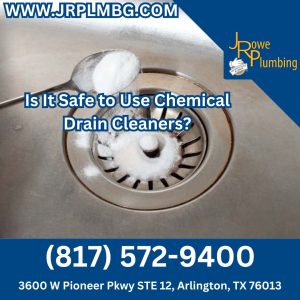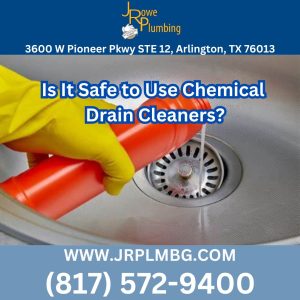When homeowners encounter a clogged drain, reaching for a chemical drain cleaner can seem like an easy fix. However, this quick solution often causes more harm than good. In Arlington Texas, where plumbing systems are vulnerable to seasonal shifts and mineral buildup, understanding safer alternatives is key to long-term maintenance.

How Chemical Drain Cleaners Work
Chemical drain cleaners operate by using potent compounds such as sodium hydroxide, sulfuric acid, or bleach-based oxidizers to dissolve organic clogs like hair, grease, and soap scum. These reactions often generate heat, which helps break down the blockage. However, that same heat and chemical intensity can weaken pipe materials over time.
There are three main types:
- Caustic Cleaners: Often contain lye or potash to dissolve organic matter.
- Oxidizing Cleaners: Use bleach or nitrates to break down clogs through chemical reactions.
- Acidic Cleaners: Contain sulfuric or hydrochloric acid, typically used by professionals.
Risks to Your Plumbing System
Despite their effectiveness in some scenarios, chemical drain cleaners can have several negative impacts on residential plumbing:
1. Pipe Corrosion and Damage
The chemical reactions produce significant heat, which can corrode metal pipes and soften or warp PVC piping, especially in older systems.
2. Temporary Fixes Only
These cleaners often treat surface-level clogs while deeper issues like pipe misalignment, root invasion, or grease buildup go unaddressed.
3. Septic System Interference
For homes with septic tanks, these cleaners can disrupt the microbial balance, preventing effective waste breakdown and leading to more complex plumbing issues.
Health and Environmental Concerns
Chemical drain cleaners pose several dangers beyond plumbing damage:
- Fumes: Inhaling the vapor can irritate the eyes, throat, and lungs, especially in confined areas.
- Skin Contact: Accidental splashes may result in chemical burns or allergic reactions.
- Environmental Impact: Residue that enters waterways can harm aquatic life and contaminate drinking water sources.
In a community like Arlington Texas, where environmental awareness is increasing, it’s vital to minimize the chemical load on our drainage systems.
Safer Alternatives for Clearing Drains
Thankfully, homeowners have multiple safe and effective options that don’t involve harsh chemicals:
Mechanical Solutions
- Plungers: Excellent for dislodging small clogs in sinks or tubs.
- Drain Snakes: Flexible augers that remove hair and debris from U-bends.
- Wet/Dry Vacuums: Useful for extracting stubborn blockages near drain openings.
Natural Home Remedies
- Baking Soda & Vinegar: A classic method using 1/2 cup of baking soda followed by 1/2 cup of vinegar, letting it sit for 30 minutes before flushing with hot water.
- Boiling Water: Helps dissolve soap scum and minor grease accumulations.
Enzyme-Based Drain Cleaners
These products use bacteria and enzymes to gradually digest organic material without damaging your pipes or septic systems. Regular use can prevent future clogs and improve drain health.

When to Call a Professional Plumber
Despite your best efforts, some plumbing problems require expert attention. Here are signs that it’s time to consult a licensed plumber:
- Persistent clogs that return frequently.
- Multiple slow drains in different areas of the home.
- Foul odors that linger near drain openings.
- Gurgling noises when water runs.
- Standing water that doesn’t improve with mechanical methods.
In Arlington Texas, older homes often deal with underground tree root intrusions or pipe degradation that only professional tools and expertise can resolve.
The Hidden Costs of Convenience
While chemical cleaners offer a seemingly quick solution, their long-term consequences can be costly. Repeated exposure to caustic agents weakens pipe structures and may cause microfractures that lead to leaks or complete failure. Additionally, residual chemicals may interact unpredictably with other household substances, creating dangerous gases or further clogging issues.
Using chemical drain cleaners also complicates future plumbing work, as leftover residues can be hazardous for plumbers handling pipe repairs or replacements.
Best Practices for Drain Maintenance
To minimize the risk of clogs and avoid harsh chemicals, adopt the following preventative strategies:
- Avoid disposing of grease, coffee grounds, or food scraps in kitchen sinks.
- Use drain guards to catch hair and debris in showers and bathtubs.
- Flush kitchen drains weekly with boiling water.
- Treat drains monthly with enzyme-based cleaners.
- Schedule annual plumbing inspections to detect early issues.
These steps contribute to a healthier plumbing system and reduce your dependency on emergency fixes.
Why Local Plumbing Expertise Matters
Hiring a professional with local experience ensures a tailored approach to your plumbing needs. In Arlington Texas, plumbing systems are affected by clay-rich soil, seasonal temperature shifts, and varying water hardness. Local professionals understand these unique variables and can recommend long-lasting solutions that chemical cleaners simply cannot provide.
Whether it’s high-pressure water jetting, in-pipe camera inspections, or full drain replacements, local plumbers come equipped with the tools and knowledge to address problems safely and efficiently.
Conclusion: Skip the Chemicals, Choose Professional Care
So, is it safe to use chemical drain cleaners? Rarely. While they may offer a short-term fix for minor clogs, the risks to your plumbing, health, and environment far outweigh the benefits.
Prioritize preventive care through safer alternatives and regular maintenance. When deeper issues arise, don’t rely on chemical shortcuts. Instead, consult a plumbing professional who understands your home’s needs and can deliver safe, effective solutions that last.
For homeowners in Arlington Texas, partnering with a trusted plumber ensures peace of mind and keeps your plumbing system running smoothly for years to come.





